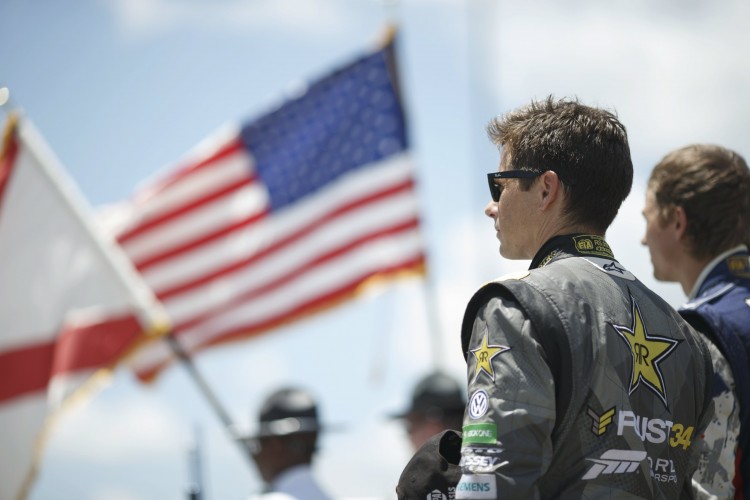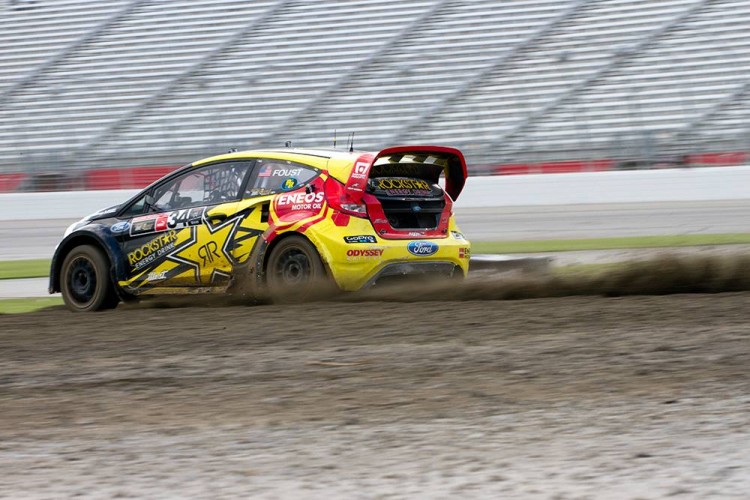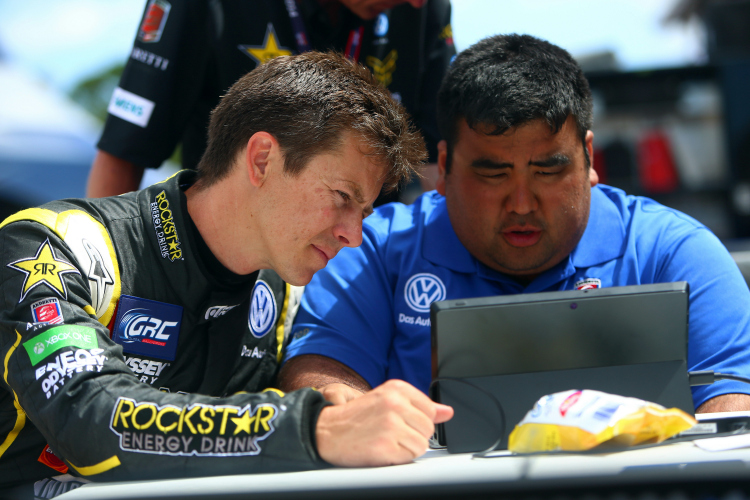In this series on thecheckeredflag.co.uk, we take a look back on the first five seasons of Red Bull Global Rallycross, shining the spotlight on the star drivers that helped catapult the fledgling series to international fame and success.
In this second instalment, Tanner Foust is in the hot seat. The former Formula Drift champion is the most successful driver in GRC history with a record eight final wins, 20 podiums, and 959 points. He’s won in all but one season he’s competed in, and he’s been in all of them, making him the only driver in the series’ history to have competed in every single GRC race since day one.
Rallycross right now is enjoying something of a renaissance. Big on both sides of the Atlantic, the sport got a kick-start in the middle of last decade when short-course car races took place at the X Games, utilising rally cars. Foust was one man who could see the potential to grow this event into it’s own big thing and after taking part in races in Europe to hone his skills, Foust began to get the ball rolling on what would eventually become ‘Global Rally Cross‘.
“Before there was rallycross in the United States I started competing in rallycross in Europe because it was good preparation for the short-course style of rally that we were doing in X Games at the time,” said Foust. “As I dug deeper into the sport, it became obvious how cool it would be to have a series in the United States and I started talking with my manager at the time about how to bring the sport over here. I wanted to focus on racing and continued to compete while he found some partners and founded the series that became GRC.”

Foust could see the potential for rallycross to succeed Stateside – Credit: Larry Chen/Red Bull Global Rallycross
When the series eventually kicked off in 2011 Foust, who as well as being a star name in the world of drifting had worked in TV and film for a number of years, wasn’t the only big name driver to sign up.
Action sports stars such as Travis Pastrana, Dave Mirra, and Brian Deegan joined big names from the motorsport world such as Rhys Millen, David Higgins, and the great Marcus Gronholm to give the unique new championship an all star driver lineup that helped rallycross instantly leave its mark on the US market – something that stage rally had always struggled to do.
“We were doing something that was so different but that checked so many boxes that I think it was hard to resist. U.S. manufacturers were struggling to get exposure out of stage rally in the U.S. but they still needed to make their cars do amazing things on the track,” said Foust. “Guys like Pastrana, Mirra and Deegan saw the opportunity to practice for a relatively new X Games event while forming valuable relationships with manufacturers through rallycross.”
“Plus they were able to bring their fans and partners, like Rockstar in my case, into this new discipline,” he added. “The stage rally series was very involved early on but eventually most of us who were in X Games moved toward rallycross.”
The first season proved to be a success with four events taking place across the US, culminating in a finale at the X Games in Los Angeles. Foust ended the first season as champion, a feat he repeated a year later despite the stiff competition.

GRC’s deal with SMI saw them race at many NASCAR tracks, including Atlanta – Credit: Matt Kalish/Red Bull Global Rallycross
For the second season, GRC teamed up with Speedway Motorsports Incorporated (SMI) which saw the expanded calendar share the stage with both IndyCar and NASCAR events, giving GRC much needed exposure alongside more established championships.
“In 2012, we raced as a support series to some NASCAR events on modified tracks during their event weekends,” Foust said. “Having all these fans of that very traditional form of American racing watching us for the first time was wild. I don’t think they knew what to make of us at first, but we won over a lot of people.”
Eventually the deal with SMI would end and the nature of GRC’s tracks would change, as would the locations. With the series firmly finding its feet, it could now take itself to the people, utilising purpose built facilities in cities across the world as it became the world’s first truly global rallycross championship
“Racing on a track and racing on a temporary circuit are different experiences,” said Foust. “When the series got its start, I think it was easier and more cost effective for organizers to use existing facilities but the vision has always been that the sport is portable and that we could bring it to the fans, instead of having them drive out to a racetrack to see it.”

Foust raced a Ford Fiesta in the early years of GRC – Credit: Matt Kalish/Red Bull Global Rallycross
Much like the events themselves, the cars have also evolved in the years since GRC kicked off. For the first three years of competition, Foust raced a Ford Fiesta ran by Olsbergs MSE, a car that still competes to this day, although the look and name are the only similarities to his championship-winning chariot.
“They are completely different machines today than they were in 2011. They’re faster. They’re more agile. They’re more durable,” Foust said. “You used to see modified rally cars out there and now they’re all purpose-built at a very high level just to do this.”
Since 2014 Foust, along with current team mate Scott Speed, has raced a Volkswagen Beetle. Unlike the Fiestas he raced in the early days, this wasn’t a cut-and-shut adapted rally car. This was one of the first true thoroughbred racing cars developed specifically for Global Rallycross.
“They’re more like a road race car – especially in the United States where we don’t see as much dirt as you do in Europe,” he added. “The Volkswagen Andretti Rallycross Beetles that we race were developed jointly by Volkswagen Motorsport engineers and the incredible team at the Andretti organization and they are very sophisticated machines.”

Foust has driven the highly sophisticated Volkswagen Beetle since 2014 – Credit: Chris Tedesco
Volkswagen Andretti’s programme, spearheaded by Foust, quickly set a precedent which saw a number of top-level motorsport teams follow them into the championship. More manufacturer-backed entries are expected in the coming years too.
“I think the teams and manufacturers that have pushed the technical part of the sport to the next level. We’ve got organizations coming into the sport from other disciplines who are helping to introduce new technology and new tactics to rallycross,” he said. “And the funding from manufacturers who are committed to winning and committed to supporting their teams pushes all of us to perform at our best.”
And Foust believes the advancements won’t stop here. Now of course backed by Red Bull, Global Rallycross has grown into one of the world’s premier racing championships – something that’s all the more remarkable considering the 2016 season will only be the series’ sixth.
“The unique thing about rallycross is that with the drivers’ massive social media following and a network of youth oriented sponsors there’s a ton of value for manufacturers off the track also, it all just keeps fuelling the fire for progress.”

Andretti Autosport have worked closely with Volkswagen in recent years – Credit: Alison Padron



